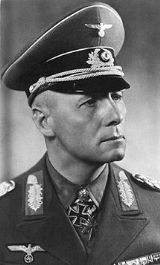
Erwin Rommel
Erwin Johannes Eugen Rommel (15 November 1891 – 14 October 1944) was a German Field Marshal and commander of the Deutsches Afrika Korps in World War II. He is also known by his nickname The Desert Fox (Der Wüstenfuchs).
Sourced
- In a man to man fight, the winner is he who has one more round in his magazine.
- Infanterie greift an (1937), translated as Infantry Attacks (1979); edited by Lee Allen, p.60
- Courage which goes against military expediency is stupidity, or, if it is insisted upon by a commander, irresponsibility.
- Letter (9 November 1942); as quoted in The Rommel Papers (1982) edited by Basil Henry Liddell Hart
- In view of my services in Africa, I have the chance of dying by poison. Two generals have brought it with them. It is fatal in three seconds. If I take the poison, none of the usual steps will be taken against my family; that is, against you. They will also leave my staff alone.
- Statement from Rommel's suicide note, choosing death by cyanide, rather than one involving the threatened persecution of his family and staff, after being implicated in a plot to assassinate Adolf Hitler.
- Mortal danger is an effective antidote for fixed ideas.
- As quoted in The Rommel Papers (1982) edited by Basil Henry Liddell Hart
- The German soldier has impressed the world, however the Italian Bersagliere soldier has impressed the German soldier.
- On the plaque dedicated to the Bersaglieri that fought at Mersa Matruh and Alamein.
- [speaking about Italians] Good soldiers, bad officers; however don't forget that without them we would not have any Civilization.
- As quoted in The Rommel Papers (1982) edited by Basil Henry Liddell Hart
About Rommel
- We have a very daring and skillful opponent against us, and, may I say across the havoc of war, a great General.
- Winston Churchill, during a 1942 debate in the British Parliament over a censure vote against Churchill for his failure to defeat Rommel. The vote failed.
- Rommel was jumpy, wanted to do everything at once, then lost interest. Rommel was my superior in command in Normandy. I cannot say Rommel wasn't a good general. When successful, he was good; during reverses, he became depressed.
- Sepp Dietrich, to Leon Goldensohn (28 February 1946)
- He was the best leader of fast-moving troops but only up to army level. Above that level it was too much for him. Rommel was given too much responsibility. He was a good commander for a corps of army but he was too moody, too changeable. One moment he would be enthusiastic, next moment depressed.
- Albert Kesselring, to Leon Goldensohn (4 February 1946)
- Anybody who came under the spell of his personality turned into a real soldier. He seemed to know what the enemy were like and how they would react.
- Theodor Werner, an officer who, during World War I, served under Rommel
